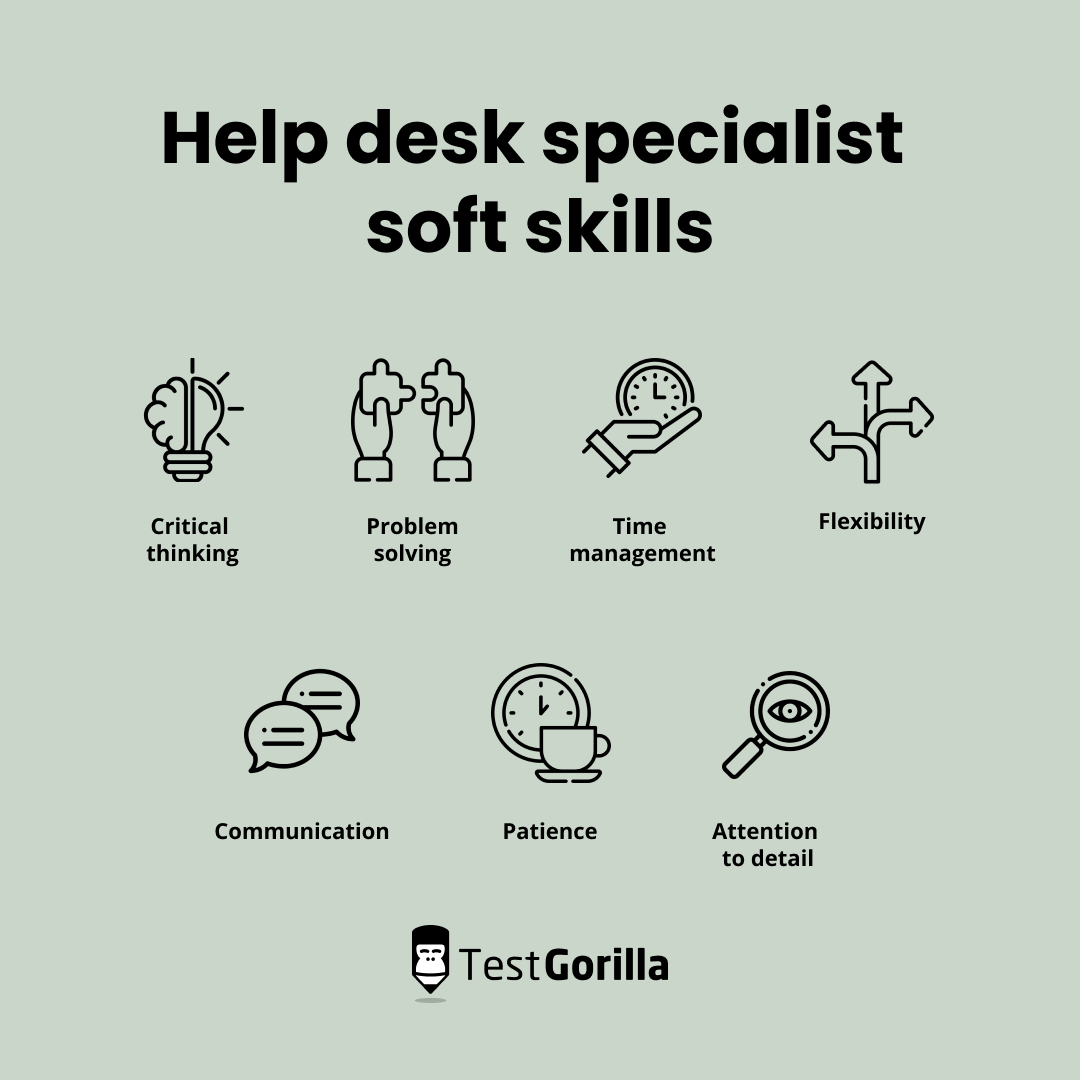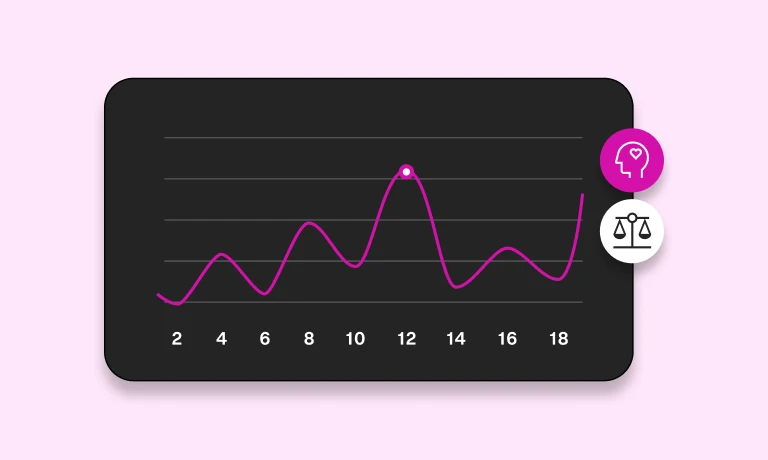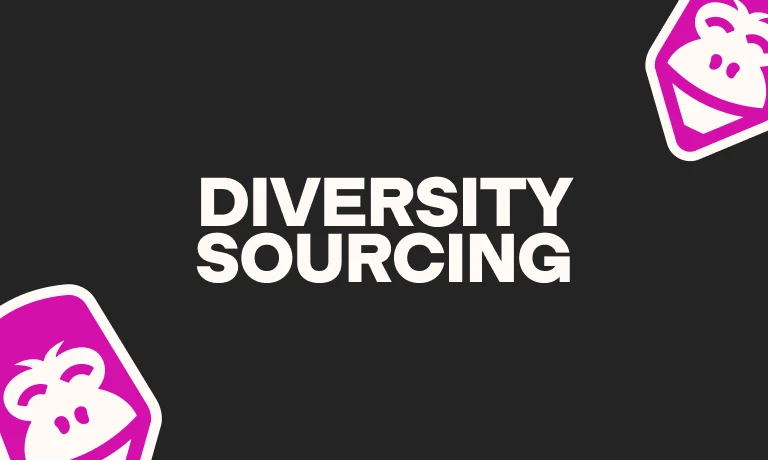Maintaining a good relationship between your company and your customers is vital for the success of your business.
Offering a high-quality product or service is not enough for customer satisfaction: You need to provide reliable customer support (CS), too, and for this, you need a strong CS team with excellent customer service skills.
However, providing customer service is no longer the responsibility of just one department.
The focus on customer experience is growing. According to Gartner, back in 2010, only 36% of businesses competed on the basis of customer experience, while in 2016, the number has grown to 89%.
This is where help desk specialists step in.
Customers need answers, and the help desk is where they can find them.
Since this is the first point of contact in urgent situations between representatives of your IT team and your clients, it’s important to hire reliable and resourceful help desk specialists.
Help desk specialists primarily work in IT, but they can also work in various other industries such as finance, education, telecommunications, and healthcare. In general, any industry that provides technical or customer support may require the services of help desk specialists.
Troubleshooting a printer, upgrading security software, granting access to new systems, and investigating configuration errors — these are all examples of the daily tasks of a help desk specialist.
While this may sound simple compared to other IT job roles, the work that a help desk specialist does is essential to the success of the company. Without proper maintenance and guidance, customer satisfaction with any product or service will be significantly reduced.
To ensure you’re hiring the right candidate for such a responsible job role, you must develop a help desk specialist hiring process that enables you to quickly and effectively identify applicants who have the right skills for the job.
In this article, we will guide you through all the steps you need to take to hire a help desk specialist. Read on to learn more about the essential help desk specialist skills, how to assess them objectively, how to write a good help desk specialist job description, and some questions you can ask candidates during the interview process.
Table of contents
- What is a help desk specialist?
- Help desk specialist hard skills
- Help desk specialist soft skills
- How to test help desk specialist skills
- Where to find a help desk specialist
- Help desk specialist job description template
- How much does a help desk specialist cost?
- Help desk specialist interview questions
- Streamline your hiring process by using pre-employment testing
What is a help desk specialist?
Typically, a help desk means centralized help provided for users within an enterprise. It can be as simple as a desk where one person takes calls from clients in real-time and guides them through their issues, or as complex as a global organization with hundreds of employees that work through online support requests and reports.
The professionals who work at a help desk are called help desk specialists. Help desk specialists are in charge of responding to inquiries and technical requests. Walking customers through the problem-solving process and following up with them to ensure everything has been dealt with is the main responsibility of a help desk specialist.
Using email, chat, phone calls, or remote support software, help desk specialists must be prepared to provide reliable technical support for issues related to computers, software, and other technology. Help desk specialists must excel at problem-solving because the essence of their job is to identify root causes and provide solutions to problems as quickly as possible.
The job of a help desk specialist is not easy. As a customer service representative, a help desk specialist is responsible to satisfy the customer’s needs and maintain your company’s reputation as a reliable provider of your products or services. In this way, they act as the face of your company.
Help desk specialists work in a dynamic and fast-paced environment and are continuously overrun with requests, so their job can be quite stressful. Although it’s an entry-level IT job, help desk specialist is one of the most demanding job roles.
That’s why you need to evaluate your candidates thoroughly when you’re hiring a help desk specialist. It’s a key position for the customer’s satisfaction with your organization, and it’s crucial for your company’s success to find the right person for it.
What’s the difference between a customer service specialist and a help desk specialist?
While there are many similarities between these two job roles to the point that some people use them interchangeably, customer service specialists and help desk specialists fulfill different functions. The main differences between the roles include:
Focus. Customer service specialists are focused on the customer experience (CX), while help desk specialists are focused on technology and solving practical issues.
Daily tasks. Help desk specialists handle technology queries, resolve practical issues, and troubleshoot technical errors. Customer service specialists mostly answer questions and complaints.
Point of contact. When a problem arises, customer service specialists act as the first point of contact between your company and your customers. Help desk specialists are the only point of contact between your IT team and your customers.
Means of communication. While both job roles use chat or phone for communicating with the end user, help desk specialists often have additional channels like remote support software and ticketing systems.
Help desk specialist hard skills
Some of the most important hard skills for a help desk specialist include:
Technical aptitude
Technology is developing fast. According to an Edelman study, 61% of participants stated that technology is evolving too fast. In two years, things in the tech world may seem a lot different than they do right now. That’s why it’s important to hire people with strong technical skills when you’re looking for a help desk specialist.
Technical aptitude is the innate potential to perform well at technical tasks. People with technical aptitude can:
Learn how to use new software quickly
Perform technical tasks more effectively
Help clients solve their technical issues efficiently
Discover shortcuts and new functions in the software they’re using
Software skills
You need to look for candidates who can work with basic help desk software — or are willing to learn. Working with specific technology is a daily requirement for every help desk specialist. Ticketing systems and issue-tracking systems are a necessity for this job role.
If you want someone to provide reliable technical assistance and support for your clients, hire a help desk specialist who has strong knowledge of software such as:
Zendesk
Wireshark
Jira Service Desk
Hiver
Zoho Desk
Even if your applicants don’t have experience with the exact tools you’re using, take into consideration any experience they might have with similar software.
Typing speed
Customers rely on help desk specialists to help them in urgent situations. Often, there are many requests submitted at a time, and clients expect them to be solved as soon as possible.
Good typing speed is really important in such situations because it allows your help desk specialist to work through multiple queries and get back to the clients faster.
Research
Help desk specialists are met with a variety of problems on a daily basis. Inevitably, they will not be prepared for every specific issue. Nevertheless, clients will count on them to react quickly and efficiently.
This is where good research skills come in handy. To troubleshoot and solve problems effectively, help desk specialists must be able to:
Recognize patterns
Evaluate data from every angle
Identify reliable sources of information
Categorize and operate the collected data efficiently
The best insights on HR and recruitment, delivered to your inbox.
Biweekly updates. No spam. Unsubscribe any time.
Help desk specialist soft skills
Any job role that involves communicating with clients requires a variety of strong soft skills. Soft skills are abilities that relate to how a person interacts with people and works. These skills are harder to evaluate because there are no certificates for them.
Pre-employment skills testing can help you assess many different soft skills. You can find a large variety of skills tests in TestGorilla’s test library.
Some soft skills that help desk specialists have to use regularly are:
Critical thinking
Having an analytical mind is essential for any help desk specialist. They need to be able to analyze information and make logical deductions and assumptions in order to resolve end-user issues effectively.
Think of help desk specialists as detectives of sorts.
To properly assess the client’s problem, they must investigate the cause and ask specific questions that will help them understand the reason and find a solution. Thinking critically is a necessity.
Help desk specialists with strong critical thinking skills can:
Think ahead and plan
Research various topics effectively
Make accurate judgments
Target their audience successfully
Attune their language and tone to meet a specific goal
Problem-solving
The main task that help desk specialists have to perform at work is solving problems. Diagnosing and troubleshooting complex issues, as well as developing and implementing easy-to-understand solutions, are part of their day-to-day responsibilities.
That’s why problem-solving is a crucial skill for any help desk specialist to have.
Being good at problem-solving means:
Accurately assessing problems
Generating a list of possible solutions
Evaluating which one would be the most effective
Implementing the solution
Tracking down progress and using the data to optimize the solution
Time management
Time management is often confused with punctuality, such as arriving on time at work. However, the skill of managing time is actually related to being able to prioritize tasks in order to provide the highest possible value to clients.
Being good at time management means being able to collaborate well with people by delegating tasks and asking for support when necessary and asking for support. These are all essential skills for a help desk specialist.
Help desk specialists with strong time management skills can:
Identify which tasks to prioritize
Plan effectively their course of action
Execute their plans
Meet deadlines consistently
Reflect on their performance and find ways to optimize it when possible
Flexibility
Arguably the most important skill for any job role connected to customer service is flexibility. The more adaptable someone is, the better they can learn directly from the client what needs to be improved.
Help desk specialists often find themselves facing uncommon situations in which they have to act quickly. Being flexible and open to new approaches and solutions is a great way to be more productive in such scenarios.
Communication
Communication, unsurprisingly, is important for any job role that serves as a connection between your company and the end user.
It’s particularly important for help desk specialists because their role requires them to regularly collaborate with other IT team members to resolve end-user queries. This involves both verbal and written communication, as they often have to contact their coworkers remotely.
Having strong communication skills allows you to:
Clarify goals and make sure everyone else is on board
Understand other people’s issues
Guide people through solutions in a clear and concise manner
Resolve conflicts quickly
Collaborate effectively with team members
Provide and receive constructive feedback
Patience
Working with customers who are dealing with stressful issues can be quite draining. Patience is a tool that every help desk specialist can benefit from equipping. A patient help desk specialist can:
Remain calm and focused at work
Establish a connection with the client and earn their trust
Get to the bottom of the problem faster and reach an effective solution
Attention to detail
When trying to solve a problem, it’s essential to get to the root of it. That’s why it’s important to listen carefully when the issue is being described and pay attention to the details. Missing the tiniest bit of information can make a big difference in the overall quality of work.
A help desk specialist who is attentive to detail will:
Provide faster solutions
Save time wasted on fixing avoidable mistakes
Develop a strong understanding of complex situations
How to test help desk specialist skills
Hiring effective and skilled employees is essential for the success of any business. However, reviewing resumes can’t provide a real grasp of the candidates’ skills, and if you don’t filter your candidates properly, conducting interviews can become too time-consuming.
Pre-employment skills testing can offer objective insights about the current role-related skills of your candidates. Extensive research has been done to guarantee that skills tests are a reliable and unbiased way to evaluate certain abilities and aptitudes.
There are different types of pre-employment tests that can help you assess a wide variety of skills and characteristics in your candidates. These include:
Cognitive ability. These tests measure a candidate’s mental abilities. They don’t measure what you know but how you think. Some examples of mental skills are critical thinking, problem-solving, and spatial reasoning.
Software skills. These assessments evaluate the candidates’ ability to use specific software tools or learn to use new ones.
Job-specific knowledge. There are a variety of tests that will evaluate your candidates’ hard skills needed for the job. For example, knowledge of legal terminology.
Personality. With personality tests, you can measure characteristics such as attitudes, interests, interpersonal relations, and motivation. It’s important to find out what drives your candidates and what they value the most.
Pre-employment testing is an essential part of recruitment. Implementing pre-employment skills testing in your hiring process will greatly reduce your:
Hiring costs
Time to fill
Company turnover
Number of bad hires
To find a high-quality help desk specialist, build a skills assessment of up to five tests relevant to the job role. We recommend choosing five of the following tests:
Technical Support Help Desk Representative. This test will help you evaluate candidates with knowledge of networks, security, and troubleshooting procedures. Identify candidates with strong technical aptitude and the ability to provide effective technical assistance.
Wireshark. Wireshark is a network protocol analyzer used to identify issues for troubleshooting, security enhancement, and performance improvement. This test will allow you to find candidates who can operate with Wireshark.
Zendesk. Zendesk is one of the most popular software platforms for ticket handling, tracking statistics of issues, and managing reports that can be used for performance improvement. Test your candidates’ practical skills with the software to find a help desk specialist who can efficiently handle their daily tasks.
Call Center Representative. This test is particularly helpful when hiring a help desk specialist who communicates via phone. This test allows you to evaluate your candidates’ skills in verbal communication, active listening, problem-solving, and teamwork.
Typing Speed. Use the typing speed test for help desk specialists who operate mostly via emails or chat and must type fast. It allows you to identify candidates who can type quickly and accurately.
Time Management. This test assesses how well a candidate can prioritize and plan tasks according to importance, deadlines, and impact, as well as their skills in executing tasks effectively.
Critical Thinking. This test will help you evaluate your candidates’ critical thinking skills by letting them solve inductive and deductive reasoning problems. This way, you can hire candidates to evaluate and process information accurately and make solid judgments without assumptions.
Communication. Excellent communication is crucial for any help desk specialist as their role requires communicating clearly and effectively with end users and teammates. Use this test to identify candidates who can facilitate effective collaboration with others.
Problem-solving. A large part of the day-to-day responsibilities of a help desk specialist is to solve problems. This test assesses candidates who can use critical thinking and decision-making skills to evaluate and respond to complex situations.
Attention to Detail (textual). This skills test will help you find candidates who can use their analytical skills to thoroughly and carefully match, filter, and process information. Hire a help desk specialist who can consider every detail before coming to a conclusion.
Culture Add. The Culture Add test allows you to find candidates who can excel at being a company representative and a point of contact with your clients because they share your company’s culture. With its help, you can hire a help desk specialist who supports your company’s values and mission.
→ For additional expert insights, check out our full guide on assessing technical support help desk rep skills.
Where to find a help desk specialist
Once you know what you’re looking for and how to identify the right candidate, it’s time to decide where to start looking. Standard job boards like Indeed and Monster can do the trick, but you can also look for high quality talent on less common platforms.
Here are our recommendations for hiring both in-house and freelance help desk specialists.
Where to find in-house help desk specialists
ZipRecruiter. ZipRecruiter is well-known for its AI matching functions and filtering. It posts your jobs on 100 different job sites. However, the cost of advertising and adding additional job platforms can be prohibitive for smaller organizations.
ScionTechnical. ScionTechnical has been connecting businesses to highly skilled help desk specialists since 2006. They have a diverse and large pool of candidates for help desk jobs.
FlexJobs. At FlexJobs, you can find qualified help desk specialists for remote or flexible work. It’s very helpful for companies that are looking to hire someone who doesn’t regularly work at the office.
Where to find freelance help desk specialists
NSC Global. This company provides services from a global network of highly qualified IT specialists, including help desk specialists. They oversee the process and guarantee the services of their employees, but the number of team members they have is quite limited, so they might not be available at all times.
Guru. Posting a job is free, and you can find freelancers from all over the world on Guru.
Upwork. Upwork has positioned itself as the luxury site for freelancers. While posting there is more costly than on other freelancer job boards, the platform offers a fine selection of qualified professionals.
Help desk specialist job description template
[YOUR COMPANY’S NAME] is looking for a help desk specialist with exceptional customer service skills and strong technological aptitude to respond to our customer’s queries and requests.
As our help desk specialist, you will be responsible for providing technical support for our end users.
You should be able to provide solutions for technical problems and effectively guide users through the steps to resolve their issues.
Help desk specialist responsibilities and duties
Diagnose and troubleshoot problems and provide effective solutions
Walk the clients through the problem-solving process step by step
Follow up with end users to provide status updates for the issue
Serve as a focal point for users’ concerns
Run reports to examine malfunctions that occur continuously
Perform account management and maintenance for a variety of systems, networks, applications, and servers
Assist the engineering team
Collaborate with teammates to resolve issues effectively
Help desk specialist requirements
Minimum 1+ year experience with level 1 or above in help desk jobs (or equivalent)
Experience assisting customers on the phone, by email, or through live chat
Excellent problem-solving skills
Team player that focuses on interpersonal skills
Ability to effectively prioritize tasks and meet deadlines
Capable of working in a dynamic and high-paced environment
Curious about job descriptions for similar roles? Check out our job description templates, including our IT support specialist job description.
How much does a help desk specialist cost?
So how much should you offer your help desk specialist?
According to salary.com, the average help desk specialist salary in the US is $47,989. It usually ranges between $43,289 and $53,202. Of course, this depends on multiple factors, such as the years of experience of the candidate and additional technical skills.
Don’t give up even if you’re only able to offer a salary that is closer to the lower end of the range. You can make up for it with other benefits, perks, or a more flexible schedule.
Help desk specialist interview questions
When you’re hiring a help desk specialist, it’s best to prepare questions for the interview in advance. Here are some recommendations for interview questions that can help you identify the right candidate:
How do you keep up with technological trends and innovations, and how does it affect your work?
How do you deal with frustrated users in order to handle a stressful situation?
Have you ever taken an issue with a customer to a higher level of technical support? What was it about?
Describe a situation when you had to talk to someone with no technical knowledge or skills about a technical issue they had.
Do you prefer written or verbal communication? Why?
Describe a good experience you had with a help desk or customer support specialist as a customer. What made it good?
What qualities make you a good team player?
Consider adding troubleshooting questions specific to the help desk specialist role, too, such as Linux troubleshooting interview questions.
Streamline your hiring process by using pre-employment testing
The process of hiring a help desk specialist can be challenging regardless of the level of expertise you’re looking for. Working with customers can be overwhelming for someone who lacks the necessary skills for the job.
That’s why you should make sure you’re evaluating your candidates’ skills effectively and without bias.
Thankfully, with the right tools, such as a skills assessment platform, you can streamline your help desk specialist recruitment process effortlessly and make sure you’re always hiring the right people for the job.
Implement pre-employment skills testing with TestGorilla. Try out our free plan today.
You've scrolled this far
Why not try TestGorilla for free, and see what happens when you put skills first.



















